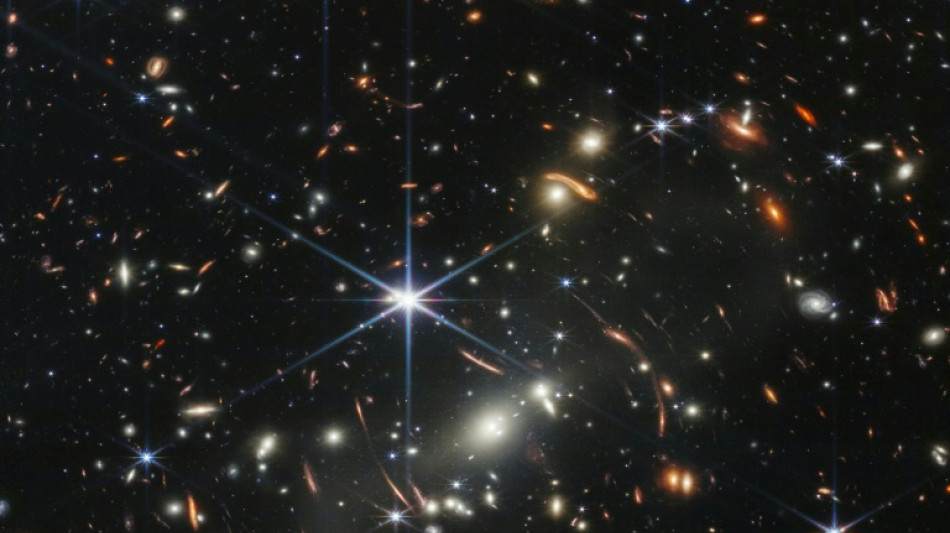
-
 Athens hit with several months of rain in one day: expert
Athens hit with several months of rain in one day: expert
-
Ubisoft shares plunge after big-bang restructuring announced

-
 Mendis' unbeaten 93 anchors Sri Lanka to 271-6 against England
Mendis' unbeaten 93 anchors Sri Lanka to 271-6 against England
-
Reeling Napoli face Juve after 'unacceptable' Champions League showing

-
 Actor Liz Hurley in tears as accuses UK tabloid of 'monstrous' conduct
Actor Liz Hurley in tears as accuses UK tabloid of 'monstrous' conduct
-
What we know about Trump's Greenland 'framework' deal

-
 Osaka 'confused' as testy exchange sours Australian Open win
Osaka 'confused' as testy exchange sours Australian Open win
-
Trump launches 'Board of Peace' at Davos

-
 Stocks rally as Trump drops Greenland tariff threats
Stocks rally as Trump drops Greenland tariff threats
-
Mercedes unveil 2026 F1 car for new 2026 rules

-
 Djokovic, Sinner plough on in Melbourne, Wawrinka makes history
Djokovic, Sinner plough on in Melbourne, Wawrinka makes history
-
Kitzbuehel's Hahnenkamm, the terrifying Super Bowl of skiing

-
 'Oasis of stability': Madrid becomes luxury housing haven
'Oasis of stability': Madrid becomes luxury housing haven
-
Swiatek says packed tennis season makes it 'impossible' to switch off

-
 Sloppy Osaka grinds past 'mad' Cirstea to stay alive at Australian Open
Sloppy Osaka grinds past 'mad' Cirstea to stay alive at Australian Open
-
Iran Guards chief says 'finger on trigger', warns US against 'miscalculations'

-
 Imperious Sinner barrels into Australian Open round three
Imperious Sinner barrels into Australian Open round three
-
Storms, heavy rain kill 9 children across Afghanistan

-
 Games giant Ubisoft suffers share price collapse
Games giant Ubisoft suffers share price collapse
-
Exhausted Wawrinka battles on in Melbourne farewell after five-set epic

-
 'Too dangerous to go to hospital': a glimpse into Iran's protest crackdown
'Too dangerous to go to hospital': a glimpse into Iran's protest crackdown
-
Bruised European allies wary after Trump's Greenland climbdown

-
 Austrian ex-agent goes on trial in Russia spying case
Austrian ex-agent goes on trial in Russia spying case
-
Japan suspends restart of world's biggest nuclear plant

-
 Djokovic, Swiatek roll into Melbourne third round, Keys defence alive
Djokovic, Swiatek roll into Melbourne third round, Keys defence alive
-
New Zealand landslips kill at least two, others missing

-
 Djokovic says heaving Australian Open crowds 'good problem'
Djokovic says heaving Australian Open crowds 'good problem'
-
Swiatek in cruise control to make Australian Open third round

-
 Austrian ex-agent to go on trial in Russia spying case
Austrian ex-agent to go on trial in Russia spying case
-
Bangladesh launches campaigns for first post-Hasina elections

-
 Afghan resistance museum gets revamp under Taliban rule
Afghan resistance museum gets revamp under Taliban rule
-
Multiple people missing in New Zealand landslips

-
 Sundance Film Festival hits Utah, one last time
Sundance Film Festival hits Utah, one last time
-
Philippines convicts journalist on terror charge called 'absurd'

-
 Anisimova grinds down Siniakova in 'crazy' Australian Open clash
Anisimova grinds down Siniakova in 'crazy' Australian Open clash
-
Djokovic rolls into Melbourne third round, Keys defence alive

-
 Vine, Narvaez take control after dominant Tour Down Under stage win
Vine, Narvaez take control after dominant Tour Down Under stage win
-
Chile police arrest suspect over deadly wildfires

-
 Djokovic eases into Melbourne third round - with help from a tree
Djokovic eases into Melbourne third round - with help from a tree
-
Keys draws on champion mindset to make Australian Open third round

-
 Knicks halt losing streak with record 120-66 thrashing of Nets
Knicks halt losing streak with record 120-66 thrashing of Nets
-
Philippine President Marcos hit with impeachment complaint

-
 Trump to unveil 'Board of Peace' at Davos after Greenland backtrack
Trump to unveil 'Board of Peace' at Davos after Greenland backtrack
-
Bitter-sweet as Pegula crushes doubles partner at Australian Open

-
 Hong Kong starts security trial of Tiananmen vigil organisers
Hong Kong starts security trial of Tiananmen vigil organisers
-
Keys into Melbourne third round with Sinner, Djokovic primed

-
 Bangladesh launches campaigns for first post-Hasina polls
Bangladesh launches campaigns for first post-Hasina polls
-
Stocks track Wall St rally as Trump cools tariff threats in Davos

-
 South Korea's economy grew just 1% in 2025, lowest in five years
South Korea's economy grew just 1% in 2025, lowest in five years
-
Snowboard champ Hirano suffers fractures ahead of Olympics


'Mind-blowing': Astronomers spot most distant radio burst yet
Eight billion years ago, something happened in a distant galaxy that sent an incredibly powerful blast of radio waves hurtling through the universe.
It finally arrived at Earth on June 10 last year and -- though it lasted less than a thousandth of a second -- a radio telescope in Australia managed to pick up the signal.
This flash from the cosmos was a fast radio burst (FRB), a little-understood phenomenon first discovered in 2007.
Astronomers revealed on Thursday that this particular FRB was more powerful and came from much farther away than any previously recorded, having travelled eight billion light years from when the universe was less than half its current age.
Exactly what causes FRBs has become one of astronomy's great mysteries. There was early speculation that they could be radio communication beamed from some kind of extraterrestrial, particularly because some of the signals repeat.
However scientists believe the prime suspects are distant dead stars called magnetars, which are the most magnetic objects in the universe.
Ryan Shannon, an astrophysicist at Australia's Swinburne University, told AFP it was "mind-blowing" that the ASKAP radio telescope in Western Australia had spotted the radio burst last year.
- 'Lucky' -
"We were lucky to be looking at that little spot in the sky for that one millisecond after the eight billion years the pulse had travelled to catch it," said Shannon, co-author of a study describing the find in the journal Science.
The FRB easily beat the previous record holder, which was from around five billion light years away, he added.
The pulse was so powerful that -- in under a millisecond -- it released as much energy as the Sun emits over 30 years.
Shannon said that there could be hundreds of thousands of FRBs flashing in the sky every day.
But around a thousand have been detected so far, and scientists have only been able to work out where just 50 came from -- which is crucial to understanding them.
To find out where the latest radio burst -- dubbed FRB 20220610A -- came from, the researchers turned to the Very Large Telescope in Chile.
It found that the signal originated from a particularly clumpy galaxy that may have been merging with one or two other galaxies, which could in turn have created the bizarre magnetar.
Shannon emphasised that this was just the team's "best hunch".
FRBs have been detected coming from unexpected places, including from within our own Milky Way galaxy, so "the jury's still out" on what causes them, he said.
Aside from trying to uncover the secrets of FRBs, scientists hope to use them as a tool to shed light on another of the universe's mysteries.
- Where's the matter? -
Just five percent of the universe is made up of normal matter -- what everything you can see is made out of -- while the rest is thought to be composed of the little understood dark matter and dark energy.
But when astronomers count up all the stars and galaxies in the universe, more than half of that five percent of normal matter is "missing", Shannon said.
Scientists believe this missing matter is spread out in thin filaments connecting galaxies called the cosmic web, however it is so diffuse current telescopes cannot see it.
That's where fast radio bursts come in.
They are "imprinted with the signature of all the gas they travel through", Shannon said.
Some FRB wavelengths are slightly slowed down when travelling through this matter, giving scientists a way to measure it.
This could allow them work out how much matter is in the cosmic web -- and therefore, the total weight of the universe.
For the record-breaking FRB, Shannon said the team had noticed signals of "extra materials" the burst had passed through on its journey through the universe.
But to use this information to get a proper measurement of the universe's weight, hundreds more FRBs will likely need to be observed, he added.
With much more advanced radio telescopes expected to go online soon, astronomers hope that will happen relatively quickly.
Liam Connor, an astrophysicist at the California Institute of Technology not involved in the research, told AFP that future radio telescopes will find tens of thousands of FRBs, allowing scientists to weigh all the matter "across cosmic epochs".
U.Maertens--VB



